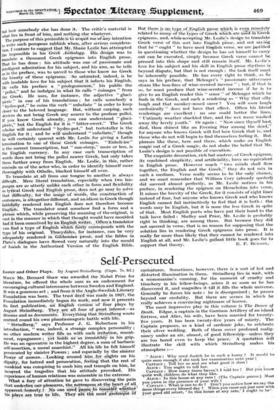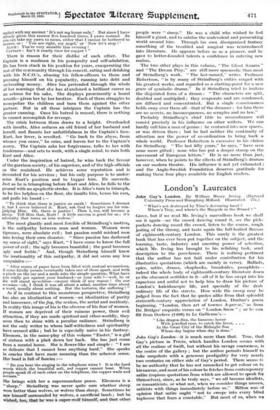Self-Persecuted
Easter and Other Plays. By August Strindberg. (Cape. 7s. 6d.)
WHEN Mr. Bernard Shaw was awarded the Nobel Prize for literature, he offered the whole sum as an endowment for encouraging cultural intercourse between Sweden and England. It was a generous act ; and from it the Anglo-Swedish Literary Foundation was born: The trust deed was made in 1927, the Foundation immediately began its work, and now it presents its first publication, an' English version " tOur plays by August Strindberg. - -.They ;are all, four of great interest—as dramas and as documents. Everything that Strindberg wrote centred round his own phantasmagoric battle with life.
" Strindberg," says Professor J. O. Robertson in his introduction, " was, indeed, a strange complex personality ; no Other modern writer fills us with such irritation, resent- ment, repugnance ; yet hold tilso" irresistibly in his grip. lie was an egocentric in the highest degree, a man of barbaric self-assertion, a moral anarchist."- All his life he felt himself persecuted by sinister Powers ; and especially by the sinister Power of woman. -Looking around hini,for -plights on his dignity, for hatred and persecution,. feeling that the rest of mankind was conspiring to snub hirn and trample on him, he incutred the tragedies that his attitude proyoked. His exPerience of human relations was miserable in the extreme.
What a fury of attention he gave to discovering the pain thatundertieiyour.pleasures, the rottenness akthe heart of all aPParent-hopesty1- No one need- pttua-,to eonsider wfirethei'
his plays are true to life. They are the most of
caricatures. Sometimes, however, there is n sort of hot and distorted illuMination in them. Strindberg lies in wait., with a monomaniac's cunning, for the moment of cruelty and treachery in his fellow-beings, seizes it as soon as he has discovered it, and magnifies it till it fills the whole universe. Generally he forces his note : he is disorganized ;_he passes beyond our credulity. But there are scenes in which he really achieves a convincing nightmare of horror.
"The most impressive play in this volume is The Dance of Death. Edgar, a captain in the Garrison Artillery of an island fiirtress, and Alice, his wife, haVe been married for twenty- five years. It has been twenty-five -years of misery. The Captain proposes, as a kind of sardonic joke, to celebrate their silver wedding. Both of them cover profound malig- nancy under an air, almost, of good fellowship—unless they are too bored even to keep the "peace—.: 4 quotation Will illustrate the skill with which' Strindberg makes his atmosphere :— - " ALICE Why need Judith be in such a hurry,? It would be quite soon enough if she took her examination next year 1. CAPTAIN : Tell her so and see what good it does 1
Amex : You ought to tell her. • CAPTAIN : How many times haven't I told her ! But you know quite well, children do what they like. Sues In this house at any rate 1 (The Captain yawn.) Must
you yawn in the presence of your.bvde_ how CAPTAIN : What is one to do ? Ch't you notice ow we say the same things every blessed day ? When you Call20 out just now with itout good old retort. ' In this house at any rate,' I ought to he-- replied with my ancient' It's not my house only.' But since I have already given this answer five hundred times, I yawn instead. So you can take my yawn to mean, either that I cannot be bothered to paver, or : You are right, my angel,' or Now let's stop ! '
AucE : You're very amiable this evening ! CAPTAIN : Isn't it nearly time for supper ? "
There is reason for their dislike of each othet. The Captain is a madman in his pomposity and self-adulation.
lie has been stuck in his position for years, exasperating the rest of the community through his conceit, eating and drinking with his N.C.O.'s, abusing his fellow-officers to them and preening himself on his Popularity, running into debt and embezzling money. Mice has pretended through the whole of her marriage that she has at andoned a brilliant career as an actress for his sake. She displays prominently a laurel wreath—given her by her brother. Each of them struggles to monopolize the children and turn them against the other partner. But in all these intrigues the Captain has the greater cunning. Once his hatred is roused, there is nothing he cannot accomplish for revenge.
The crisis between them draws to a height. Overloaded with insults, Alice seduces an old friend of her husband and herself, and flaunts her unfaithfulness in the Captain's face. Kurt, her lover, is revolted. " Go back to the abyss, from whence you came," he cries, and leaves her to the Captain's mercy. The Captain asks her forgiveness, talks to her with tenderness—and sets to work, with a single mind, to ruin both Kurt and Alice.
Under the inspiration of hatred, he wins back the favour of the garrison society, of his superiors, and of the high officials on the mainland. He achieves some reputation and is decorated for his services ; but his only purpose is to under- mine Kurt's position and to beggar him. He succeeds. Just as he is triumphing before Kurt and Alice, he falls to the ground with an apoplectic stroke. It is Mice's turn to triumph. As he lies helpless on the floor, she insults him, boxes his ears, and pulls his beard :—
" To think that there is justice on earth ! Sometimes I dreamt It, but I never believed it. Kurt, ask God to forgive me for mis- judging Him. Oh, there is justice ! Then I, too, will become a sheep. Tell Him that, Kurt ! A little success is good for us ; it's adversity that turns us into wolves."
The most ghastly and most forcible of Strindberg's motives is the antipathy between man and woman. Women were tigresses, were absolute evil ; but passion could mislead men into loving their own disaster. " Since passion has darkened my sense of sight," says Kurt, " I have come to know the full power of evil ; the ugly becomes beautiful ; the good becomes ugly and feeble." And, though Strindberg himself knew the irrationality of this antipathy, it did not seem any less compulsive :— " After reams of paper have been filled with mutual accusations, if some kindly person eventually takes one of them apart, and with a pinch on the ear and a smile asks the simple question,. What have you really got against your husband—or your wife ?—well, he or she will stand speechless—cannot think of any reason ! On one occasion—oh, I think it was all about a salad, another time about a word, usually about nothing. But the tortures, the suffering ! "
As if in contrast to this monstrous perspective, Strindberg has also an idealization of women—an idealization of purity and innocence, of the fay, the sexless, the aerial and maidenly. In reality this image of his is the obverse of his fear of women. If women are deprived of their ruinous power, their evil attraction, if they are made spiritual and other-worldly, they seem then to shine with a peculiar radiance. Strindberg is not the only writer to whom half-wittedness and spirituality have seemed alike ; but he is especially naive in his fantasy. Eleonora, in the name-play of this volume "Easter," is a girl of sixteen with a plait down her back. She has just come from a mental home. She is flower-like and simple : " I am so delicate that I cannot bear anything hard." She speaks in oracles that have more meaning than the soberest sense. Her head is full of fancies :--
" Do you hear the singing in the telephone wires ? It is the hard words which the beautiful soft, red copper cannot bear. When people speak ill of each other on the telephone, the copper wails and accuses.
She brings with her a supermundane peace. Eleonora is a " sheep." Strindberg was never quite sure whether sheep were better than wolves, or wolves than sheep. Sometimes he saw himself surrounded by wolves, a sacrificial lamb ; but he wished, too, that he was a super-wolf himself, and that other people were' " sheep." He was a child who wished to feel himself a giant, and to subdue the malevolent and persecuting World around him. Through his own disorganized fantasy something of the troubled and magical was reintroduced into literature. He appears before us as a pioneer, and he gave to better-founded talents a confidence in entering new realms.
The two other plays in this volume, " The Ghost Sonata " and "The Dream Play," are still more spasmodic than most of Strindberg's work. " The last-named," writes Professor Robertson, " is by many of Strindberg's critics ranged with his greatest works, and regarded as a starting-point for a new genre of symbolic drama." In it Strindberg tried to imitate the disjointed form of a dream : " The characters are split, doubled and multiplied ; they evaporate and are condensed, are diffused and concentrated. But a single consciousness holds sway over them all—that of the dreamer ; for him there are no secrets, no inconsequences, no scruples and no law."
Probably Strindberg's chief title to remembrance will consist' precisely in his influence on other writers. We can hardly call him a man of genius : he ventured into new spaces, or was driven there ; but he had neither the continuity of attention nor the power of co-ordination to bring back a whole world. Professor Robertson is excessive in his claims for Strindberg. " The last fifty years," he says, " have seen none more gifted ; none who has put a deeper stamp on the movement of European letters." He is no more than just, however, when he points to the effects of Strindberg's dramas on our modern theatre. His influence is not yet exhausted ; and the Anglo-Swedish Foundation deserves gratitude for making these four plays available for English readers.

















































 Previous page
Previous page